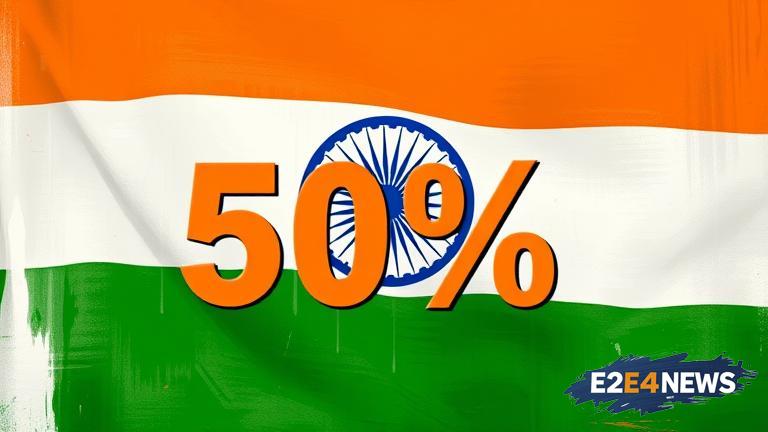The Trump administration has taken a major step in its trade policy with India, issuing an official notice that imposes a 50% tariff on Indian goods. This move is expected to have far-reaching consequences for India-US trade relations, which have already been strained in recent months. The notice, which was issued by the US Trade Representative, states that the tariff will be imposed on a range of Indian goods, including textiles, pharmaceuticals, and agricultural products. The tariff is expected to come into effect soon, although the exact date has not been specified. The move is seen as a response to India’s decision to impose retaliatory tariffs on US goods, which was announced earlier this year. The US has been critical of India’s trade policies, which it says are unfair and discriminatory. The Trump administration has been seeking to renegotiate the trade relationship between the two countries, but so far, no agreement has been reached. The imposition of the tariff is likely to escalate tensions between the two countries, and could have significant implications for businesses and consumers on both sides. India has already expressed its opposition to the move, with the government saying that it will take all necessary steps to protect the interests of Indian exporters. The Indian government has also said that it will impose retaliatory tariffs on US goods, which could further escalate the trade dispute. The US is one of India’s largest trading partners, and the imposition of the tariff could have significant implications for India’s economy. The Indian rupee has already weakened against the US dollar in response to the news, and there are concerns that the tariff could lead to higher prices for consumers and reduced demand for Indian goods. The move is also likely to have implications for other countries, including China, which has been watching the developments in the US-India trade relationship closely. The US has been seeking to reduce its trade deficit with other countries, and the imposition of the tariff on Indian goods is seen as part of this effort. However, the move is likely to be opposed by many in the US, including businesses and consumers who rely on Indian goods. The US Chamber of Commerce has already expressed its opposition to the move, saying that it will harm American businesses and consumers. The imposition of the tariff is also likely to have implications for the global economy, which is already facing significant challenges. The move is seen as part of a broader trend of protectionism, which is being driven by the US and other countries. The World Trade Organization has expressed its concern about the trend, saying that it could lead to a decline in global trade and economic growth. The Indian government has said that it will take all necessary steps to protect the interests of Indian exporters, and will work with other countries to oppose the move. The US-India trade relationship is complex and multifaceted, and the imposition of the tariff is likely to have significant implications for both countries. The move is seen as a major setback for India-US trade relations, and could have long-term consequences for the relationship between the two countries. The Indian government has said that it will seek to negotiate a new trade agreement with the US, but so far, no agreement has been reached. The imposition of the tariff is likely to be a major issue in the upcoming US presidential election, with many candidates already expressing their opposition to the move. The move is also likely to have implications for other countries, including the EU, which has been seeking to negotiate a new trade agreement with the US. The EU has expressed its concern about the trend of protectionism, saying that it could lead to a decline in global trade and economic growth. The imposition of the tariff on Indian goods is seen as part of a broader effort by the US to reduce its trade deficit with other countries, but it is likely to have significant implications for the global economy.
